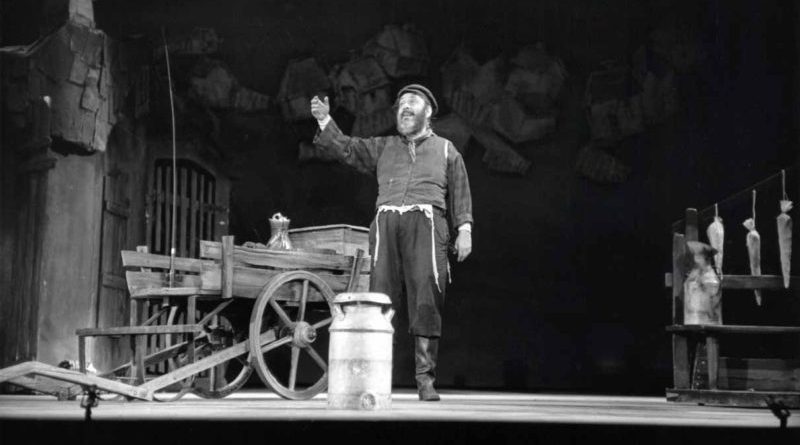INTERVIEW: New movie tracks how ‘Fiddler’ got on the roof
Photo: Zero Mostel stars in Fiddler on the Roof on Broadway in 1964. Photo courtesy of Friedman Abeles / The New York Public Library for the Performing Arts / Courtesy of Roadside Attractions and Samuel Goldwyn Films with permission.
Fiddler: A Miracle of Miracles is a new film that details how the unique and influential story of the beloved musical Fiddler on the Roof came to audiences so many decades ago. It’s an interesting origin story, brought to life by the documentary’s numerous voices, including lyricist Sheldon Harnick, producer Hal Prince, original cast member Austin Pendleton and Tony winner Harvey Fierstein, among others.
The film is the brainchild of director Max Lewkowicz. He also wrote the documentary with Valerie Thomas. Their efforts are now on display at The Landmark at 57 West and the Quad Cinema in New York City.
Fiddler on the Roof, of course, tells the story of Tevye and his love-struck daughters in turn-of-the-century Russia. Tevye’s Jewish traditions run into problems when his daughters start breaking customs, and he needs to decide whether to yield or stand firm.
The musical has been a time-honored tradition for a long time, and it seems that every few years a new revival is playing in New York City. Case in point: The current celebrated run of a Yiddish version of the musical, starring Steven Skybell and directed by Joel Grey.
Recently Hollywood Soapbox exchanged emails with Lewkowicz about the new film. Questions and answers have been slightly edited for style.
What inspired you to tell the origin story of Fiddler on the Roof?
I love the idea of the storyteller. These are the people that pass on the legends and histories and personal tales from generation to generation and maintain connections to our roots. I first met Sheldon Harnick at a seminar about the music for Fiddler, and I was hooked. His stories were amazing. He is a great storyteller in his lyrics, of course, but for me as a lover of history, Sheldon brought the past to life.
He started telling me in the first interviews the making of an unusual Broadway creation about a small fictitious village in Czarist Russia, called Anatevka and the main character named Tavy, the Jewish dairyman. The rich historical lines presenting Russia in 1905, the failed revolution against the Czar, the anti-Semitic pogroms, and the great Yiddish writings of Sholem Aleichem were interlinked with the turmoil of the 1960s when the Broadway show was being born with an amazing cast of geniuses like Sheldon, Jerry Bock, Jerome Robbins, Joe Stein, Hal Prince,and Zero Mostel.
Woman’s liberation, the civil rights movement, the morphing of new traditions and styles were an extraordinarily potent combination that presented itself on the stage as Fiddler on the Roof. And then there was both time periods relating to our lives today. Why is the show still so powerful and universal? It’s obvious to me. But Sheldon thus became my chief storyteller.
How many times have you seen the musical? Any favorite memories from over the years?
I have seen the stage show about 10 to 15 times with Topol, Fierstein, [Alfred] Molina, [Danny] Burstein, Paul Michael Glaser in the UK, [Theodore] Bikel and Skybell and many other Broadway productions. One of my favorite memories of FOTR was the first time my son, Daniel, saw me cry in the Topol version when he looked over at me sobbing.
How did you gather interviews with all of these theater luminaries?
Whenever I asked, they said yes. Everyone loves Sheldon and Fiddler. so it was not difficult. Bette Midler was the only no because she was exhausted from doing Hello, Dolly! But people were into it.
How long has the film been in development? How much research needed to be done?
The film began production immediately with interviews with Sheldon. We got a lot of historical background from Alisa Solomon who wrote Wonder of Wonders, a great history of FOTR, and Jan Huttner, who is a true Fiddler genius and author. It took us 2 and 1/2 years to complete. But we worked our asses off to get the right and correct historical info.
What do you believe the musical has to say to modern-day audiences?
Everything! How to treat fellow human beings with love and respect, how to deal with our traditions standing on their heads. We are all refugees that seek to save our precious families, how women are fighting to get respect and equality they rightfully deserve and how to dance … to make the darkness seem less dark. Tevye, today, is the same character around the world and recognized by everyone who meets him.
When did you realize you wanted to become a filmmaker?
Is that what I am?
By John Soltes / Publisher / John@HollywoodSoapbox.com
Fiddler: A Miracle of Miracles, co-written and directed by Max Lewkowicz, is now playing in New York City. Click here for more information.

